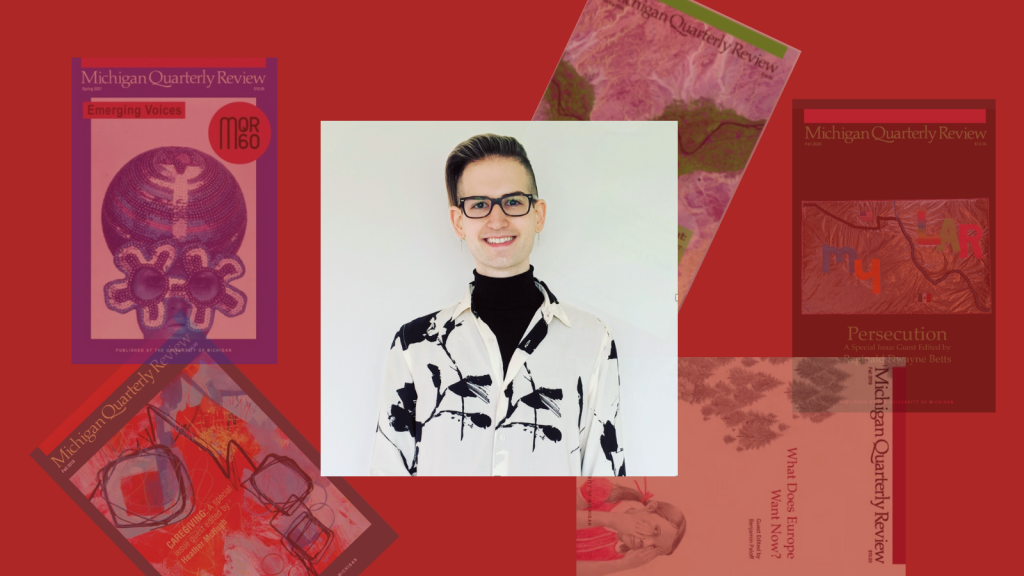The “People of MQR” series highlights the people who make up the MQR staff as they consistently contribute to the richness of the magazine and work towards making each issue the best it can be. As the people of MQR work behind the scenes, their individual writing goals, experiences, and backgrounds are not at the forefront of the magazine. This series allows us to get to know each of the people of MQR through a Q&A series about their own writing, their favorite part of working with the magazine, as well as other related questions about the writing process.
Aaron J. Stone is a PhD candidate in English at the University of Michigan. Their writing, research, and teaching interests span queer and trans studies, multiethnic U.S. literature (C20–present), modernist studies, and narrative theory. Stone’s essay on the drag competition The Boulet Brothers’ Dragulais published in the collection The Cultural Impact of RuPaul’s Drag Race (Intellect Books, 2021). Their work on Charles Chesnutt and American sexology is forthcoming in GLQ. Stone is currently at work on a book project entitled Desires for Form: Modernist Narrative and the Shape of Queer Life. In addition to scholarly research, they can occasionally be found writing poetry.
Stone serves as MQR’s Nonfiction Editor (March 2020–October 2021) and as Assistant Managing Editor (May 2021–May 2022).
What do you like most about working with MQR?
As MQR’s nonfiction editor, I’ve immensely enjoyed working with emerging authors. There’s something exhilarating about stumbling upon a sparkling essay in Submittable that would be truly brilliant with a little polishing up. Getting to discuss these pieces with their authors and share in their enthusiasm makes the work of editing a labor of love. To know that I played a small role in shaping a powerful essay, that I helped build a bridge between an up-and-coming author and an audience is a profound joy.
What is your favorite piece from MQR?
There are so many ways to answer this question, so many types of favorites, but the piece I’ve enjoyed working on the most as nonfiction editor has been “Shabda,” an essay by Risë Kevalshar Collins published in our Spring 2021 “Emerging Voices” issue. The piece is a poignant account of the author’s encounters with great loss, experience of racist violence, and quests for self-reinvention. If the essay itself weren’t amazing enough, getting to meet Risë (virtually) to discuss it was a great pleasure, like meeting the hero of a beloved novel. Her joie de vivre and generosity of spirit is well-captured in the pages of “Shabda.”
How would you describe your writing process?
Torturous, pleasurable, fumbling, serendipitous, anxiety-ridden, joyful, manic, epiphanic, discordant, mellifluous, haphazard, meticulous, venomous, revivifying. Depends on the day.
If you could tell your younger writing self anything, what would it be?
Write dreadful things. When I was younger—and even now, more often than I care to admit—I was very precious about my writing, afraid of how it would be judged by the audience I was imagining, even if that audience was just my future self. So I painstakingly labored over everything, refusing to share anything unfinished and often giving up entirely. Looking back on that writing, I still find it dreadful—a lot of good all that worrying did! What I wish I had done was write a lot more; you can see a lot farther standing on a mountain of garbage than a single, meticulously crafted step stool.
What are you working on now?
I’m currently working on a book project, Desires for Form: Modernist Narrative and the Shape of Queer Life. The project examines how queerpeople in the early twentieth century faced a crisis of form. As the new concept of sexual identity gave rise to subcultural communities, many queer people turned to literary narrative as a tool for exploring what shapes queer life could take. Scholars have argued that many norm-breaking literatures of this time imagined radical modes of existence for queer people. Few have considered conventional desires for things like legibility, intimacy, and belonging. This project makes two counterintuitive claims: first, that avant-garde queer novels of this time often represent desires for traditional lifestyles; and second, that “conventional” novels have been equally essential to the project that has been called queer worldmaking. Through analyses of novels depicting queer life, this project theorizes the emergence of queer identity by accounting for the social pressures that made traditional forms of life appealing to some queers and abhorrent to others.
You can find Aaron J. Stone on Instagram @aaronjonstone and Twitter @aaronjstone1.




